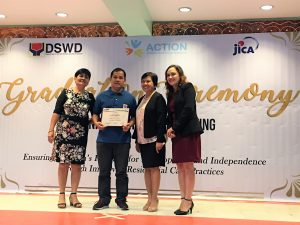
The Department of Social Welfare and Development (DSWD), together with the Japan International Cooperation Agency (JICA) and Japanese non-profit group, A Child’s Trust is Ours to Nurture (ACTION), continues to raise the standards in caring for vulnerable and marginalized children in the Philippines by continuously capacitating social workers and house parents in residential care centers and facilities.
Under the project, “Ensuring Children’s Potential for Development and Independence Through Improved Residential Care Practices,” house parents and social workers are provided with a training program that would equip them with the necessary knowledge, skills, and attitude in the proper parenting of children.
The project, which is co-implemented by the DSWD and ACTION with support from JICA, aims to improve the child care standards in the Philippines. It is currently being implemented in Region III and National Capital Region (NCR).
Last year, 52 house parents from different residential care facilities managed by the DSWD, local government units (LGUs), and non-government organizations (NGOs) graduated from the training program, which is composed of 10 modules that cover 10 critical areas of house parenting.
For 2018, the second batch of the participants composed of 54 house parents from 17 residential care facilities for children in NCR has successfully completed the training. The graduates received their certificates of completion in a graduation ceremony organized by the DSWD and ACTION on Monday.
Commitment to the development of children
In her message during yesterday’s graduation ceremony, DSWD Undersecretary for Protective Operations and Programs Group Mae Fe Ancheta-Templa thanked ACTION and JICA for their help and support in the implementation of the project and emphasized the DSWD’s commitment to the total human development of the child.
“We should always strive for quality child care especially for the marginalized and vulnerable children whose future may be shaped by the love that we have provided to them,” Usec. Templa said.
“House parents and caregivers in centers and facilities are the alternative parents of children. I salute you for the noble work that you do for them,” she told the graduates.
JICA Philippines Senior Representative, Ms. Aya Kano, also extended her warmest congratulations to the graduates. She said JICA is glad to be working with the Philippines in ensuring the welfare of Filipino children and improving the knowledge and skill of Filipino social workers and house parents.
“On behalf of JICA, we would like to reiterate our support to the next generation of Filipinos so they may have a better life ahead of them. We also continue to support the social workers and house parents under the project for them to become a role model in setting the excellence in caring for the children,” Representative Kano added.
Meanwhile, ACTION Executive Director Lani Bayron-Llanes, emphasized the role of house parents in the lives of children in centers and institutions.
“To our house parents, thank you for caring for the children. House parents are responsible for the lives of about 10 or 20 children and I believe they have nothing but the best for them. Kayo ay bayani sa buhay ng mga bata (You are heroes in the lives of the children),” she said.
Dir. Llanes also highlighted the challenges faced by the house parents and how the project helps address these. She encouraged them to not give up and continue caring for the children as their needs are slowly being recognized and addressed.
She also acknowledged the efforts of the DSWD in pushing for the provision of plantilla positions for house parents in various centers and institutions in recognition of their distinct and significant contribution to the lives of the residents.
DSWD centers for children
The DSWD currently manages 64 residential care facilities located in 16 regions in the country. Of this number, 27 facilities take care of children in need of special protection.
Among the services provided in the facilities include psychological, health, and educational services. Residents are also provided with social interventions which seek to restore and/or develop the social functioning of the children as well as homelife services, which aim to foster a homey environment to ensure that children experience family living. ###


